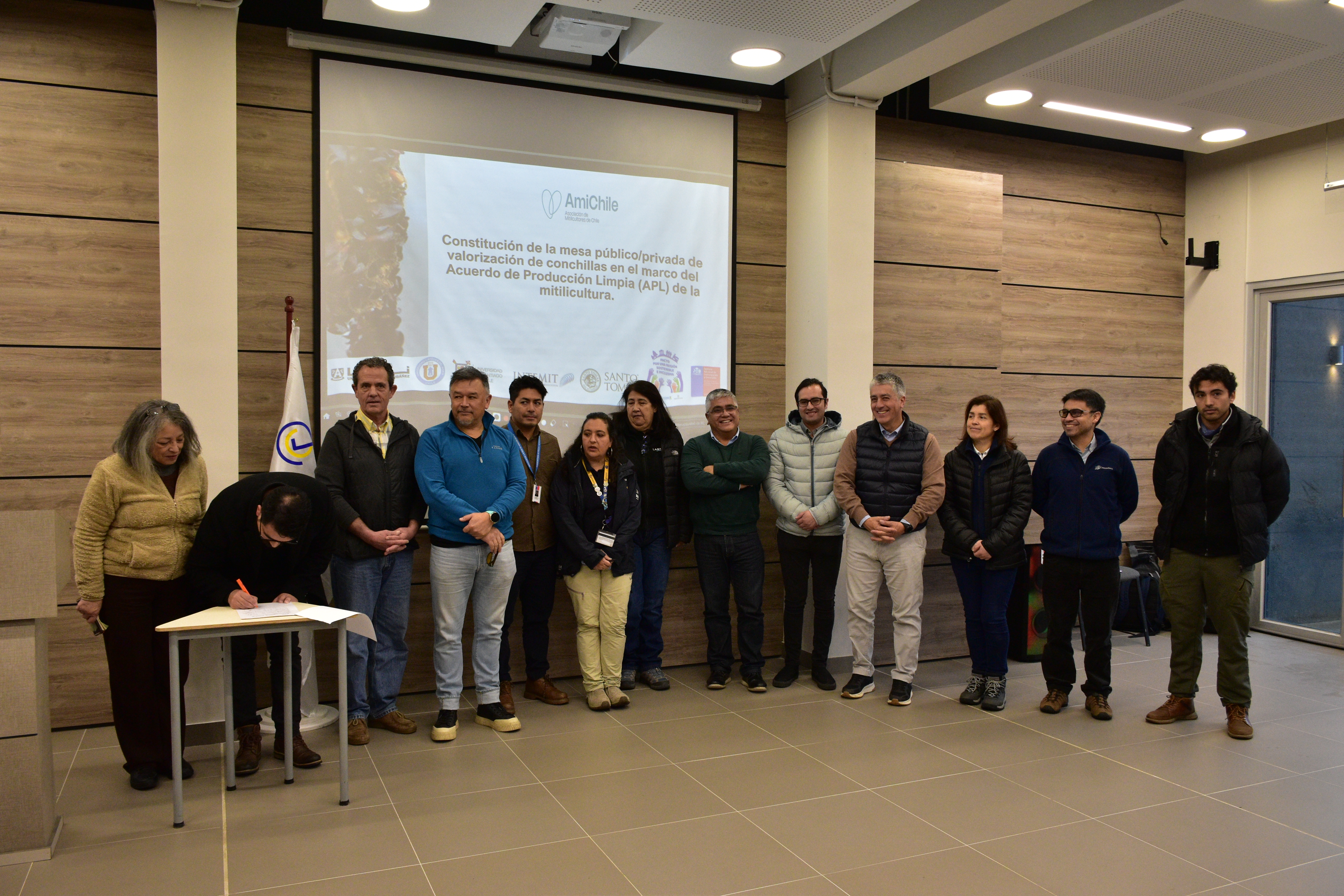
06 Jun Public/private partnership advances nature-based solutions for shell management in shellfish farming
In a workshop led by U. Santo Tomás and UCN with the support of AmiChile among other public and private institutions and held in Chiloé, key aspects in the management, innovation and regulation of shell waste and its potential in ecological restoration processes in marine environments were addressed. In this context, the public/private round table for shellfish valorization was also established within the framework of the Clean Production Agreement for shellfish farming.
The cultivation of mussels has grown exponentially in recent years, but at the same time generating shell waste equivalent to 30% of production, around 400,000 tons, a situation that has posed challenges for the activity in terms of the proper and sustainable disposal of this waste.
Within this framework, the First Workshop on Shellfish Management for Ecological Restoration was held this Tuesday at CEDUC UCN in Castro, Chiloé, with the support of institutions such as the Center for Research and Innovation and Climate Change of the Universidad Santo Tomás, Universidad Católica del Norte, U. Santiago de Chile, U. Adolfo Ibáñez and collaborating institutions such as AmiChile, Intemit, Asociación Gremial Reloncaví Sur, and Instituto Milenio en Socio-Ecología Socio-Ecología. Santiago de Chile, U. Adolfo Ibáñez and the support of collaborating institutions such as AmiChile, Intemit, Asociación Gremial Reloncaví Sur, and Instituto Milenio en Socio-Ecología Costera (SECOS), among others.
The event was attended by representatives of Sernapesca, Subpesca, mitigiculture production companies, local municipalities and the Sustainability and Climate Change Agency, who were part of the presentations and a participatory workshop facilitated by UST, IEB and SECOS researcher, María José Martínez-Harms.
For the director of the CiiC-UST and SECOS researcher, Nelson Lagos, “it is important to return the carbonate from the shells to the ocean, because the mussel beds from which they originate provide essential ecosystem services. They are based on natural functions such as calcification, dissolution and regeneration of carbonate, which occur naturally in these ecosystems. If we better understand and disseminate these ecosystem functions, the services received by the industry and society as a whole will also be strengthened”.
The also director of the Shell-NBS ring project, which seeks to develop nature-based strategies for the socio-ecological sustainability of mytiliculture, highlighted that “the conversation highlighted both important gaps that we must address as researchers, as well as opportunities for diversification for science. Shell recycling should not only be seen from the perspective of the marine environment, but also in how it connects with terrestrial systems – for example, in soil improvement – which opens up new lines of research and application.”
“Regarding scientific evidence, today we have knowledge that supports the reuse of this resource, especially in the context of climate change and the restoration of coastal ecosystems,” she added.
Along these lines, Begoña Peceño, researcher at the Faculty of Marine Sciences of the U. Católica del Norte and director of a Fondef project dedicated to the development of artificial reefs as a nature-based solution for marine restoration using waste from mitiliculture, presented relevant aspects of the management of this waste.
“In island contexts such as Chiloé, where waste management is already complex due to geographical limitations, these wastes, coming from the sea, contain organic matter with high levels of chlorides and sulfides, which makes their management even more difficult. Because of this, and given the proximity of these activities to urban areas, innovative solutions are required”.
“Mollusk shells, composed mainly of high purity calcium carbonate, have a high potential for valorization. This compound acts as a natural regulator of marine pH and therefore, currently in this project is being incorporated in the development of artificial reefs, evaluating its ability to promote biological settlement and restoration,” added Peceño.
For Rodrigo Carrasco, executive director of AmiChile, “it is always gratifying to be in an active, participatory workshop that draws good conclusions and where the debate is prolific. We continue on the same path of working with research, with science and with the authorities, our work is just that, to articulate the public and the private, to have collaboration and a construction of the future”.
For his part, Branco Papic, manager of CalAustral, commented that “it is essential to leave behind the logic of simply disposing of waste in landfills, because that is not sustainable, it is not coherent with the urgency of climate change, and does not contribute to the well-being of future generations. As for the future, we are optimistic about the path towards the valorization of waste and by-products, a process that requires significant investment in R&D&I”.
Finally, Papic remarked that “the most important thing now is to advance not only technically, but also in the socialization and education of the community. It is not enough for the industry players to push this challenge; society as a whole needs to be involved. Only then will we be able to give these materials the value they really have as noble elements of nature, with multiple uses and benefits for a more circular and sustainable economy.”


